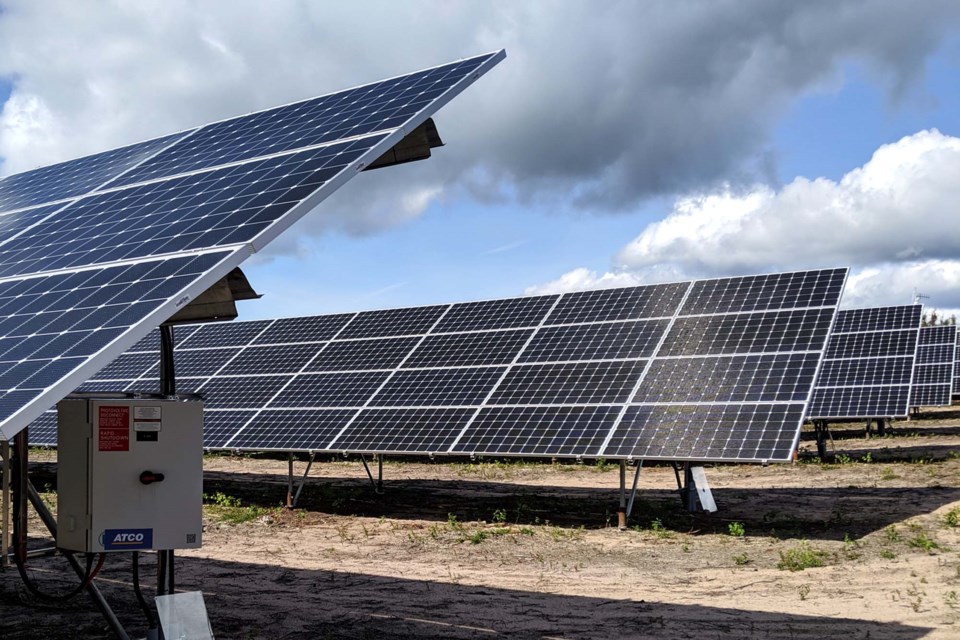The City of St. Albert will no longer pursue a solar farm project, council voted Tuesday.
The decision arrived on the heels of an administrative report which cast doubt on the economic viability of the project and its different options. The report highlighted regulatory and financial barriers to running a commercial, Municipal Own Use Generation (MOUG), and hybrid solar farm project (combining commercial and MOUG routes).
On Tuesday, council voted to rescind approval for the $26.1-million solar farm project charter, and rescind the first reading of the project’s $33.75-million borrowing bylaw, both passed on June 21, 2021.
Regan Lefebvre, the city's senior manager of utilities, outlined the city’s original intentions for the project to generate revenue, noting some assumptions made at the outset of the project — such as the availability of provincial and federal grants or low municipal borrowing rates — have changed.
In addition to increased borrowing rates, the updated report found using federal or provincial grants to offset the capital costs of the commercial solar farm would be a violation of the Electric Utilities Act.
Ultimately, Lefebvre said the internal rate of return for the commercial solar farm would not be enough to repay the proposed borrowing bylaw.
Further, a MOUG facility would generate more electricity than city facilities could consume, meaning it would not meet requirements set out in the Electric Utilities Act.
Decreasing the size of the MOUG project to meet the requirement would mean it was no longer economically viable.
The best case — the hybrid solar farm model — which could take advantage of the economies of scale of the larger commercial solar farm as well as use available grant funding due to the city using some of the power it generates, still “would not be considered a good investment” due to the low return rate, Lefebvre said.
“It’s expected that none of the solar farm options would provide a financial advantage over urban development to the land,” Lefebvre said.
Members of council thanked Lefebvre for the report, which many described as thorough.
Coun. Wes Brodhead said he wants to encourage administration to continue looking for new ways to bring revenue to St. Albert.
“The fact that this one played out the way it does just indicates the due diligence administration is doing to make sure that those activities that we want to participate in actually pay dividends to the community,” Brodhead said. “I appreciate the due diligence in that respect.”
Brodhead said if the city stops trying to be innovative, then it will continue to be left with tax revenue as the primary way of generating funding.
Councillors disagree on process
Coun. Sheena Hughes said the way the city pursues capital projects needs to change.
“Was the due diligence done this time? Yes … but we also have to take responsibility,” Hughes said. “There was no necessity to approve those projects until this level of due diligence was done.”
Hughes noted the public was not aware the city would be looking to recommend against proceeding with a borrowing bylaw until administration’s report was released last week.
“If the [report] had been different, the public really would have had almost no warning that this was going to come down, and that is … very disturbing,” Hughes said.
Coun. Ken MacKay said he has “more confidence today” in council’s process than he did before.
“I’m not disappointed in the process, I’m actually celebrating the process,” MacKay said. “This worked and we are here today making a proper decision based on the anticipated and proper analysis."
MacKay seconded Brodhead in hoping administration will continue to look for innovative ways of potentially generating revenue.
Eyes still on solar
Coun. Mike Killick noted while this project didn’t work out, rooftop solar is a viable alternative.
“We’re not giving up on solar, we’re just not going ahead with this particular proposal,” Killick said.
Coun. Natalie Joly noted the city’s public engagement around the solar farm, which was released last week alongside the agenda packet, showed some residents have a strong desire for a shift to a decreased reliance on fossil fuels.
The survey showed that those under 25 were more likely to select reduced environmental impact as a top benefit of a potential solar farm project (other options included revenue generation and positive reuse of a brownfield site).
“In the presentation [Lefebvre] mentioned this concept was never intended to reduce our carbon footprint, but I would argue that it should have,” Joly said.
Uses for the Badger Lands
Past councils had made a variety of motions related to the Badger Lands, for example that administration work towards allocating a school site on them, or create a remediation strategy proposal.
Council voted Tuesday to have administration review the potential uses for both the North and South Badger Lands (as divided by the future Fowler Way), with a recommendation for future uses to come before council before the end of 2023.
Council also passed a motion directing administration to take no action on the previous council motions directing use of the Badger Lands.
When responding to a question from Hughes about why the motion to take no action was initially recommended by administration, chief administrative officer Bill Fletcher said it would “reset the bar at zero.”
“It allows us to clear the slate and start looking at this with an unbiased eye,” Fletcher said.
David LeFlar, the city’s chief legislative officer, said there is no recommendation to rescind these previous Badger Lands motions at this time, and that any recommendation to rescind a motion would follow administration’s future analysis.
Coun. Mike Killick said he looks forward to the options for the Badger Lands, noting a “future business opportunity” for the lands “may itself be a potential way to offset costs and generate revenue."
Council voted unanimously in favour of rescinding the solar farm borrowing bylaw and project charter.




